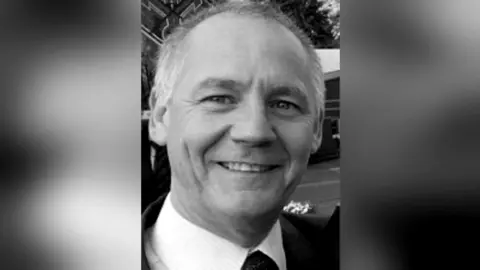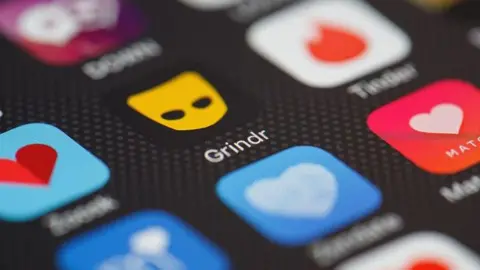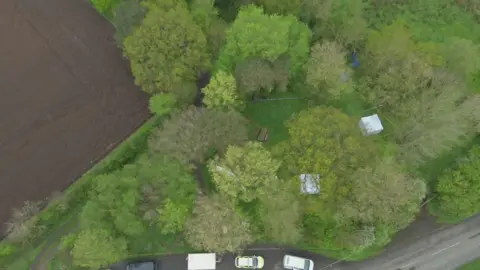How a murderer used Grindr to find victims
 Cumbria Police
Cumbria PoliceLast October, dad-of-two Paul Taylor left his home and never returned. He was murdered by a man he chatted to on Grindr. His 19-year-old killer, Jack Crawley, attempted to murder another man he also met on the app. As police encourage potential victims to come forward in an often-anonymous world, what is being done to keep people safe?
Army veteran Paul Taylor was a 56-year-old "gentle and loving" dad.
He lived in the town of Annan, Dumfries and Galloway, and worked at the Cumberland Infirmary in Carlisle.
Unbeknown to his family, he was living a double life, something they only discovered through the most harrowing of circumstances.
"I will never have the opportunity to hear from Paul about his lifestyle choices," his widow Maria wrote in a victim impact statement, adding, "but I do not judge him".
Paul was murdered by Jack Crawley.
The pair had previously met for sex through the app Grindr.
Last October, they went to a secluded area in Carlisle, where Crawley then bludgeoned Paul to death with a hammer and stole his car.
His body was not discovered until seven months later.
Crawley also attempted to murder another man near York in January, in what was called an almost "carbon copy" of Paul's murder. His victim, also in his 50s, managed to fight him off.
 Getty Images
Getty ImagesGrindr is used by three million people every month, and a recent Ofcom report found it was used by roughly 924,000 people in the UK.
It says it has safety tips, encourages people to use its video calling feature to verify an identity before meeting, and to report suspicious behaviour.
Stevie Westgarth, director of non-profit Queer Cumbria, said he believes the county's "conservative nature" means many men feel pressured to hide their sexuality through anonymous profiles.
"People feel like its normal to hide behind them," he explained.
"And it means we can't make that distinction between dangerous people hiding, and people who are hiding because they feel like they can't be their honest selves in society."
 Cumbria Police
Cumbria PoliceDescribed by a judge as a "a highly dangerous young man", Crawley was jailed for life on Wednesday.
Now aged 20, he must serve a minimum of 37 years in prison. If released, he will be around the same age as Paul was when murdered him.
During the initial stages of the investigation, Cumbria Police said it carried out "a great deal of work" with the MSM – men who have sex with men – community around safety risks.
Although it has no evidence Crawley had other victims, it encouraged people who believe "they may have been targeted" by him or anyone else, to come forward, saying they would be dealt with "sensitivity and privately".
 Cumbria Police
Cumbria PoliceAnalysis of police data by the BBC showed more than 6,000 people reported offences linked to dating apps used by people of all sexual orientations between 2017 and 2021.
Dr Ben Colliver, a criminologist at Birmingham City University, conducted research into the risks surrounding Grindr, prompted by a series of violent robberies by a gang who used the app to target LGBTQ+ people.
"What we see in the news tends to be the most extreme levels of violence," he said.
He said he believes crimes involving the app, particularly "low level violence", are underreported.
"If you haven't told anyone about your sexuality and you use Grindr to meet someone and you experience violence, how do you explain that to the police without disclosing that you were using Grindr?"
'Discretion essential'
A spokesperson for Grindr said it was "committed to creating a safe environment" and took its role "as a connector for the queer community very seriously".
"Like any social networking and dating platform, there may be instances where individuals misuse the app's features and put other users at risk," they added.
They said they "actively work to identify and block" suspected underage profiles.
"For many Grindr users, discretion is essential," a spokesperson added.
"Whether they live in one of the 60+ countries where being gay is still a crime or have other personal reasons to remain discreet, we do not require photographic verification to sign up."
'Don't blame victims'
Dr Colliver said bringing in verification measures could be a "double-edged sword", but the app does have a responsibility to those who use it.
"If you're signing up because you're not out, you don't want to see a transaction on your credit card go through from Grindr, but that's got limitations in terms of underage people accessing the app or people using it with the intention of causing harm to others," he explained.
"For repeat abusers, their account gets closed - they [then] create a new email address, sign back up and they're straight back on."
He also believes common safety precautions, like sending a picture of someone you are meeting to a friend or sharing a live location, are ineffective.
"[We think] we're making ourselves safer, [but] that doesn't stop us from experiencing violence. What that means is, five hours later, our friend will find us."
Dr Colliver said victims should not be blamed.
"Ultimately, if you agree to meet someone late at night in a secluded place, you should be safe to do so."
Additional reporting by Chris Robinson
Follow BBC Cumbria on X, Facebook, Nextdoor and Instagram. Send your story ideas to [email protected].
